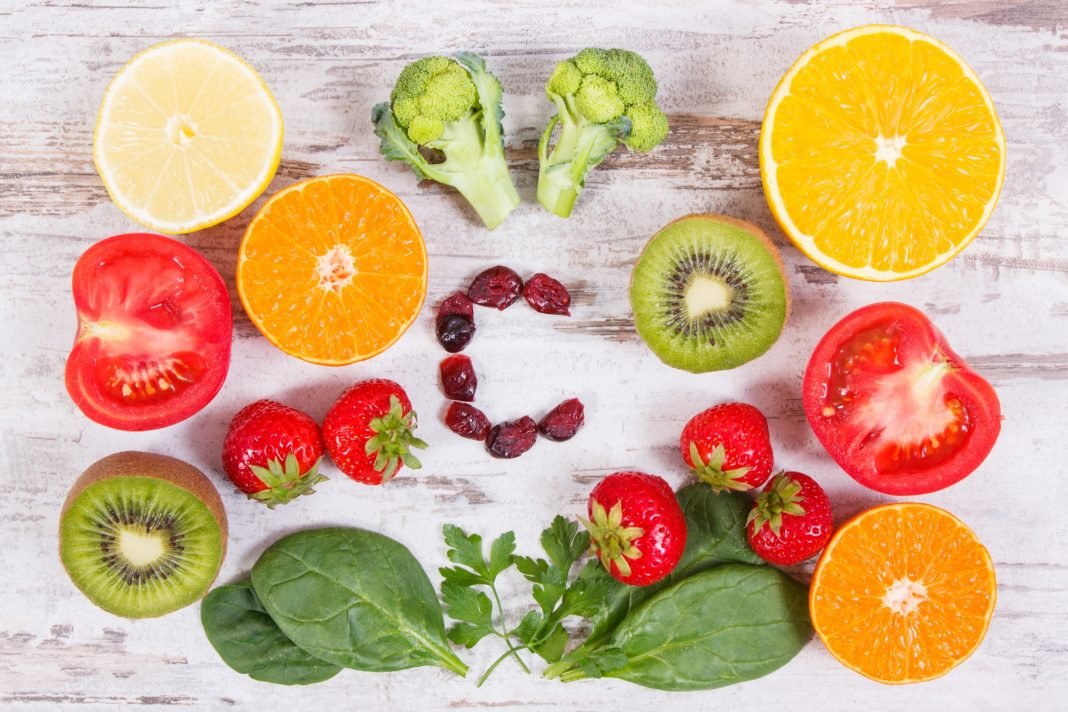What is Vitamin C?
Vitamin C is a water-soluble vitamin and is also referred to as ascorbic acid, your body doesn’t store it. You have to get what you need from food.
Using food sources for your daily nutritional needs should be your prefered method to attain a healthy balanced diet and lifestyle.
Food sources include Oranges, strawberries, papaya, kiwi, green peppers, pomegranate, broccoli, kale, African mango, pineapple, Baobab, Goji berries, acai berries and more it is also found in sprouted alfalfa seeds, bee pollen, cherry extract, wheatgrass and Bromelain.
“Vitamin C is a vital nutrient for health. It helps to form and maintain bones, skin, and blood vessels. It occurs naturally in some foods, especially, fruit and vegetables” says, Joseph Nordqvist from Medical News Today. (1)
Health benefits of Vitamin C
- Helps the functioning of the immune system
- Protect cells from oxidative stress, Fatigue and Tiredness
- Aids with the functioning of the nervous system
- Stress-related symptoms
- Collagen formation for the normal function of blood vessels, bones, cartilage, gums, skin and teeth
- Wound healing and bone maintenance
- Iron absorption
Based on reports, vitamin C may help with
- Colds, Flu and Infections
- Stress and Related Symptoms
- The health of skin, joints and collagen
- Iron deficiency
- Bruising
- Fatigue and Tiredness
Vitamin C contributes to
1) Helps the functioning of the immune system
Vitamin C can reduce the symptoms of the cold but also the length of time that it lasts especially if it is taken at the beginning of a cold. The recommended dosage is 1000 – 200omg daily. It reduces the levels of interferon while raising the activity of critical immune cells. Interferons trigger the immune response.
Reduction in pain and soreness after exercise when supplementing with 400mg Vitamin C daily, for a minimum of a couple of days before and after the training can be noticed.
2) protect cells from oxidative stress tiredness and fatigue
Smoking may cause excess free radicals in the body which heightens the demand for Vitamin C; smokers have less than average levels of Vitamin C, which may cause minor deficiency symptoms like fatigue, low immune health and poor skin conditions.
3) functioning of the nervous system
It helps normalise levels of stress hormone, which makes it useful for anyone dealing with stressful situations, or prone to stress-related issues.
4) Stress and related symptoms
Vitamin C may help balance the release of the stress hormone Cortisol, during conditions of mental and physical stress.
5) collagen synthesis for blood vessels, bones, cartilage, gums, skin and teeth
You need it for the growth and repair of tissues in all parts of your body. It helps the body make collagen, an important protein used to make skin, cartilage, tendons, ligaments, and blood vessels.
6) Wound healing and bone maintenance
Vitamin C is needed for healing wounds, and for repairing and maintaining bones and teeth. It also helps the body absorb iron from nonheme sources but also needs to be present in the body to help with certain processes, for example, for L-tyrosine and phenylalanine to be converted into dopamine.
7) Iron absorption
Vitamin C helps with iron absorption. Useful for those at risk of Iron deficiency. Including women during their menstrual cycle, and for Vegetarians and Vegans it may also increase the absorption of vitamin B1 (thiamin), Chromium and Biotin.
Vitamin C synergy, and works well with
- Valerian and B Complex used for conditions of stress
- Ginseng and B Complex helps with stress and energy
- Zinc and Echinacea may help with Immunity
- Nettle and Echinacea used for allergy problems
- Copper absorption may be lowered over time by using high intakes of Vitamin C.
- Alpha-lipoic Acid used to prevent soreness and recovery after exercise
- Rutin may be used to prevent bruising and thread veins
- Lycopene and Selenium to help with oxidative stress as it is an anti-oxidant
- N-acetyl-cysteine and Glucosamine to help with the production of collagen
- chondroitin for preserving cartilage
- Apple cider vinegar may work with vitamin c to reduce inflammation
- Desiccated Liver may help in cases of anaemia
- Coenzyme Q10 and vitamin E to help reduce swollen gums (periodontitis)
- Hyaluronic acid may help with the repair of tissues
- Bee propolis for assistance with fighting off colds
- Pau D’Arco may help to fight off colds
Vitamin C deficiency
Low levels of vitamin C have been associated with a number of conditions, including high blood pressure, gallbladder disease, stroke, some cancers, and atherosclerosis, the build-up of plaque in blood vessels that can lead to heart attack and stroke.
Vitamin C plays a central role in the antioxidant defence system and, is taken up into cells via sodium-dependent facilitated transport. Dehydroascorbate enters cells via glucose transporter and is then converted back to ascorbate within these cells. Because dehydroascorbate and glucose compete for glucose transporters, hyperglycemia will exclude vitamin C from the cell and resulted in a decreased antioxidant capacity in some cell type that is dehydroascorbate dependent., according to research. (2)
Some things to consider
Water-soluble Vitamins are deemed as low risk, although small doses of Vitamin C may cause diarrhoea in some people. Vitamin C should not be taken by people suffering from Iron-overload conditions, those with a history of kidney stones may be at risk of getting them again.
How much do you need?
According to UK National Health Service adults (19-64 years) need 40mg of vitamin C a day.
You should be able to get all the vitamin C you need from your daily diet.
Vitamin C can’t be stored in the body, so you need it in your diet every day. (3)
Resources:
- https://www.medicalnewstoday.com/articles/219352
- https://www.ncbi.nlm.nih.gov/pubmed/16118484
- https://www.nhs.uk/conditions/vitamins-and-minerals/vitamin-c/






